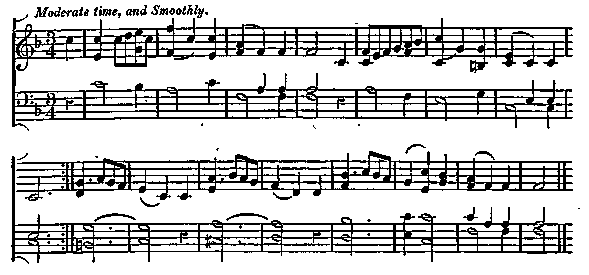Popular Music Of The Olden Time Vol 1
Ancient Songs, Ballads, & Dance Tunes, Sheet Music & Lyrics - online book
| Share page | Visit Us On FB |
|
354 |
ENGLISH SONG AND BALLAD MUSIC. |
|||
|
The Tom Tinker of The Beggars' Opera, and to which D'Urfey prints the above words, is subjoined. |
||||
|
|
||||
 |
||||
|
NORTHERN NANCY.
This tune is contained in every edition of The Dancing Master, after 1665. It is evidently only another version of With my flock as walked I (ante p. 157).* " Then plump Bolbing Joan straight call'd for her own, And thought she frisk'd better than any, Till Sisly, with pride, took the fiddler aside, And bade him strike up Northern Nanny."
Pills to purge Melancholy, ii. 232, 1719. In the Roxburghe Collection, i. 252, is a black-letter ballad, entitled "The Map of Mock-Begger Hall, with his scituation in the spacious countrey called Anywhere. To the tune of It is not your Northern Nanny; or Sweet is the lass that loves me." It commences thus:
" I read in ancient times of yore And few men seek them to repair,
That men of worthy calling Nor is there one among twenty
Built alms-houses and spittles store, That for good deeds will take any care, Which now are all down falling; While Mock-Beggar Hall stands empty"
It consists of twelve stanzas, and " Printed at London for Richard Harper, neere to the Hospitall Gate in Smithfield."
In the same Collection, iii. 218, is another version of the same ballad, issued by the same printer, but with variations in the imprint, in the number of stanzas, and in the woodcut.
The first has a woodcut of a country mansion; the second of a castle. The second has three additional stanzas, and variations in the remaining twelve. The title commences, " Mock-Begger's-Hall," instead of " The Map of;" and |
||||
|
• I had not observed the Identity of these tunes when the former sheet went to press ; otherwise I should have compressed the account of them under one head. The |
difference is chiefly in the two first bars, but even that variation is diminished in the copy called The faithful Brothers, to which I have referred at the former page. |
|||